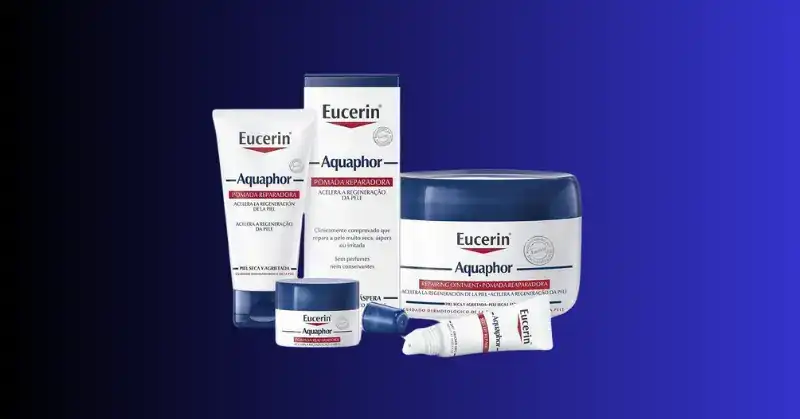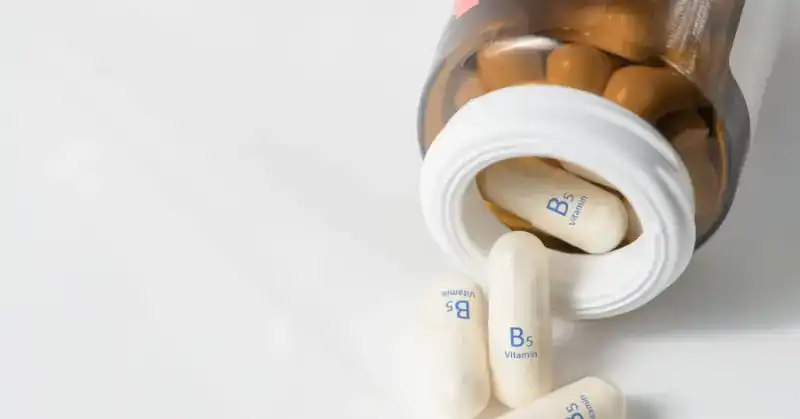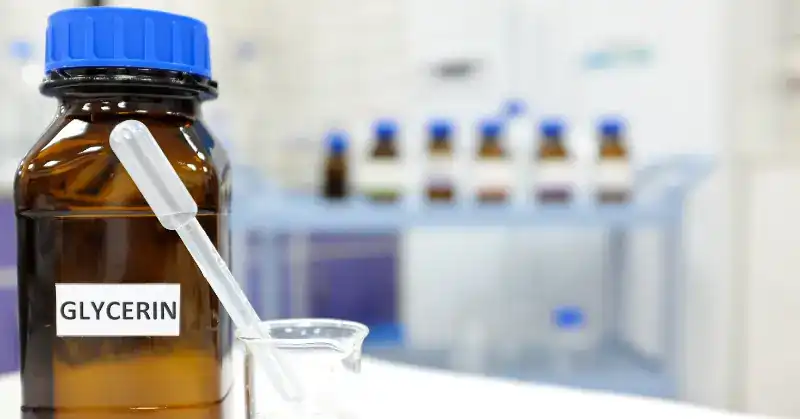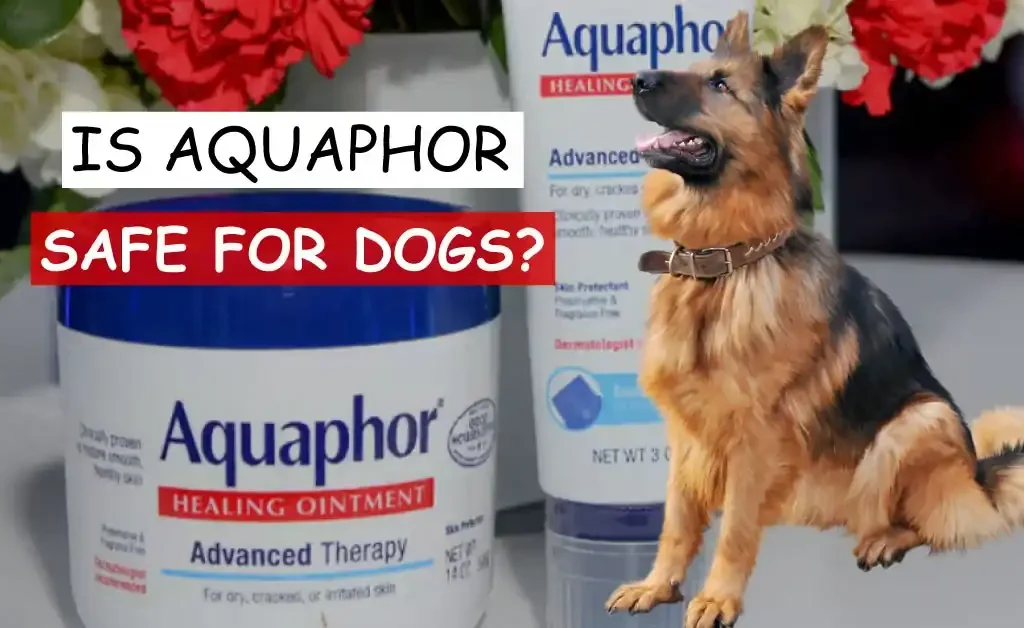Our cherished pets frequently take center stage in pet care and pampering. We carefully choose the kindest shampoos, the fluffiest beds, and the tastiest snacks to ensure their well-being and pleasure. Is Aquaphor safe for dogs? This well-known cream is a go-to remedy for skin problems in people, but can it provide the same promise for our canine companions?
In this investigation, we look into the nuances of pet skin health and speculate on Aquaphor’s possible use. Join us as we go on a trip that peels back the layers of mystery, where canine care and curiosity collide, and where we look for solutions to assure the comfort and happiness of your pet.
We’ll explore pet-friendly skincare options and determine whether Aquaphor is safe or hazardous for your dog’s delicate skin. Let’s start this search for understanding and ensure your faithful pet gets the finest care possible.
Can Dogs Safely Use Aquaphor in Their Diets?
They should not be included in dogs’ diets. The ointment Aquaphor is not meant to be swallowed by dogs or other animals; it is only meant to be applied externally to human skin. While Aquaphor is typically considered safe for topical use on humans, its makeup makes it unfit for ingesting.

Also read: Can Dogs Have Quinoa?
Petroleum jelly, mineral oil, and some additional substances are included in Aquaphor. These drugs can potentially cause digestive problems in dogs, including diarrhea, vomiting, and stomach pain. More severe health hazards might arise from consuming such goods often or in big doses.
While there may not be any immediate consequences if your dog unintentionally consumes a tiny amount of Aquaphor, it is still advised to watch for any negative responses and seek advice from your veterinarian. Based on the quantity consumed, the size, and the general health of your dog, they can offer tailored suggestions.
If you want your dog to be safe and healthy, it is crucial to keep items like Aquaphor out of its reach and avoid purposefully placing them in its diet. When choosing a suitable and secure diet for your pet, always get advice from your veterinarian.
The Toxic Components of Aquaphor Ointments for Dogs
Its components are not meant for animal consumption. If a dog ingests an Aquaphor accidentally, he may experience the following potential toxicities of Aquaphor components.
1. Petroleum Jelly
Petroleum jelly, a semi-solid combination made from petroleum, is a critical component of Aquaphor. Can I put Vaseline on my dog? Under a vet’s guidance, it can treat skin dryness. However, it might be difficult for dogs’ digestive systems to metabolize when they swallow it.
Is Vaseline or Aquaphor the same thing? It is to be noted that Vaseline is 100% made of petrolatum, while Aquaphor also has other ingredients to attain its required consistency and therapeutic effects.

Risks
- Gastrointestinal problems, including diarrhea, vomiting, and pain in the abdomen, may develop from this. If a dog ingests a lot of petroleum jelly or Vaseline, the danger increases, and gastrointestinal obstructions may result. This obstruction may clog the stomach or intestines, necessitating urgent veterinarian care.
2. Mineral Oil
Another ingredient in Aquaphor is mineral oil, a liquid byproduct of petroleum processing. Due to its moderate laxative effects, dogs who consume mineral oil may have diarrhea and dehydration.

Risks
- Mineral oil can interfere with a dog’s normal digestive processes and make it more difficult for them to absorb essential nutrients, which might eventually lead to nutritional deficiencies.
3. Additional Ingredients, such as Preservatives or Fragrances
Preservatives or other additives like perfumes that are not meant to be consumed may be present in some Aquaphor formulations. These additives may cause gastrointestinal distress in dogs, including nausea, vomiting, or diarrhea, as they can be harsh on their digestive systems.

Risks
- Some dogs could be susceptible to certain ingredients, causing consumption to cause allergic responses or skin irritations.
4. Hydrogen Peroxide
Hydrogen peroxide may be a component in several Aquaphor variants. In dogs, hydrogen peroxide poisoning can result in vomiting and gastrointestinal discomfort.

Risks
- Ingesting hydrogen peroxide may harm dogs since it can cause severe gastrointestinal upset. Thus, it should always be avoided.
5. Ceresin and Panthenol
They both are used as a skin barrier in Aquaphors and are generally non-toxic to our canine companions. Ceresin is good for treating eczema, dermatitis, and skin allergies. Meanwhile, panthenol is a vitamin B5 that ultimately converts into pantothenic acid in the body. It helps heal wounds and reduces inflammation.

Risks
- Ceresin and panthenol may prompt gastrointestinal upsets such as diarrhea and vomiting when ingested in higher doses.
6. Lanolin Alcohol
It is used as an emollient and emulsifier in Aquaphors. Lanolin alcohol is meant to treat cracky skin, itches, and irritations, leaving behind smooth and moisturized skin.

Risks
- Lanolin alcohol can cause vomiting and diarrhea in dogs. It may also lead to skin irritations or allergies in rare breeds. Moreover, if it is ingested in higher amounts, it may cause liver damage in dogs. Lanolin alcohol can counteract with blood-thinner agents.
7. Bisabolol
It is derived from chamomile and added as a natural soothing ingredient in Aquaphors. It is considered a safe component for dogs and calms skin irritations. Bisabolol also reduces inflammation and itching symptoms.
Risks
- Overconsumption of bisabolol can cause various digestive distress in dogs. Due to its content, dogs may also develop skin irritations or related sensitive reactions.
8. Glycerin
Glycerin is a humectant used in Aquaphor ointment to retain moisture in the skin. Glycerin is safe for dogs and heals dry, patchy, inflamed, and irritated skin.

Risks
- Excessive intake of glycerin can lead to abdominal pain, diarrhea, vomiting, lethargy, and, in severe cases, tremors and seizures in dogs. Always consult your vet before applying glycerin to your dog’s wounds.
Is Aquaphor safe for dogs to lick? Dogs should not lick the items listed above, including all types of lotions, ointments, and chapsticks. Otherwise, they may develop the risks mentioned above that may harm their health.
Keep them out of reach to protect dogs’ safety and well-being and avoid symptoms of ingesting Aquaphores.
Read more: Health Benefits of Giving Tamarind to Your Dog
Steps to Take if Dog Consumes Aquaphor and Treatment Options
Dogs with excessive Aquaphor exposure may need medical attention, mainly if they consume a substantial amount or exhibit adverse effects. Here is how vets could handle a dog exposed to Aquaphor.
1. Evaluation and Investigation
The first thing the vet will do is evaluate the dog’s general health. They will ask how much Aquaphor was consumed and when the exposure occurred. There will be a physical examination to look for any outward indications of discomfort or poisoning.
2. Vomiting Induction (if required)
To get rid of the ingested substance from the stomach, the veterinarian may induce vomiting in dogs that recently consumed a significant amount of Aquaphor but are not exhibiting severe symptoms.
Usually, hydrogen peroxide is used to cause vomiting. This surgery must be carried out only with a veterinarian present.
3. Charcoal Activated
In rare instances, the dog may be given activated charcoal to absorb and neutralize any leftover poisons or chemicals in the stomach. This may prevent dangerous compounds from being absorbed further.
4. Infusion Therapy
The dog may be in danger of dehydration if the Aquaphor exposure causes vomiting or diarrhea. In these situations, the veterinarian may administer intravenous (IV) fluids to maintain electrolyte balance and restore hydration.
5. Observation & Monitoring
Any negative responses, such as persistent vomiting, diarrhea, or symptoms of discomfort, will be carefully watched for in the dog. The dog’s vital signs, such as breathing and heart rate, will be monitored to determine how stable the dog is.
6. Treatment for Particular Symptoms
Additional treatments can be necessary if the dog exhibits severe gastrointestinal discomfort, abdominal pain, or obstructions. It may involve taking painkillers or having surgery to remove obstacles.
7. Blood Tests
A veterinarian may do blood tests to evaluate organ function and spot any anomalies in extreme situations or where particular toxins are a concern.
8. Support Services
Depending on the dog’s condition, supportive care may be given. It can include anti-nausea medicines, gastrointestinal lining protection drugs, and steps to address any underlying problems.
Your veterinary consultation right away is crucial when the dog may be exposed to dangerous drugs like Aquaphor. With prompt intervention and the right therapy, the dog’s chances of recovery and the danger of complications can be considerably increased.
The Dos and Don’ts of Using Aquaphor on Your Dog
In some circumstances, using Aquaphor for your dog can be beneficial, but you should proceed cautiously and with a veterinarian’s advice. Specifically created for human usage, it is a topical lotion that moisturizes and protects the skin. Let us find the truth about Aquaphor for our canine partners.
Dos
- Apply on Cracked or Dry Paw Pads
Aquaphor is one of the most often used dog products to treat dry or cracked paw pads. Environmental variables, including severe weather or warm pavement exposure, might cause this. Applying a tiny quantity of Aquaphor to your dog’s paw pads can make it more comfortable and moisturized.
- Rub on Skin Rashes
Your dog’s minor skin rashes or irritations may be relieved with Aquaphor. It may develop a barrier that prevents future irritability and encourages healing in the damaged region. In the event of more severe skin conditions, it shouldn’t be used as a substitute for veterinarian guidance and care.
- Spread on Wounds
In rare circumstances, Aquaphor can help minor cuts or abrasions heal faster. Due to its emollient qualities, the wound may heal quickly by remaining wet. Again, make sure it’s acceptable for your dog’s particular case by consulting your vet before applying it to wounds.
Don’ts
- Avoiding Chewing or Licking
Aquaphors can be a deterrent if your dog licks or chews on a specific region, such as a healing wound, because of their taste and texture. Thus, applying Aquaphor to your dog’s chapped lips is not suitable.
Although using Aquaphor on dogs may have certain advantages, it is crucial to proceed cautiously.
- Not for Puppies
Aquaphors are unsuitable for puppies who are under 8 weeks old. Pups are more sensitive than adults and are at risk of developing sensitivities or allergies.
- Avoid Using Sensitive Areas
Aquaphors may irritate when applied to dogs’ sensitive areas without protection. It must not be used to a dog’s hot spot. Seek your vet’s guidance to treat wounds of sensitive regions before applying Aquaphor there.
- Be Cautious When Applying for Skin Infections
It is best to avoid applying Aquaphors to skin infections without your vet’s consultation. Do not overuse this ointment to prevent health risks.
Pro Tips
- Speak with Your Veterinarian
Always check with your veterinarian when using human items on your dog’s skin. They can advise you on whether Aquaphor suits your dog’s particular condition and, if not, suggest substitutes. Call emergency hotline no. or veterinary care to seek advice in critical situations. Search for a dog-friendly first aid kit to prevent further harm.
- Use Moderation
Only use a small amount of Aquaphor where necessary. Excessive application might offer few advantages and can make you feel greasy.
- Watch Out for Adverse Reactions
Look for adverse effects like pain, irritation, or increased redness. If you notice any harmful effects, stop using.
How to Apply Aquaphor on Your Dog?
Everything has a suitable method and procedure to attain maximum benefits. If that isn’t followed, the aim of obtaining the effect might be disturbed. The same goes for using Aquaphor on dogs.
The following is a step-by-step guide to ensure the correct and significant procedure for maximizing the efficacy of Aquaphor for our furry friends. Applying Aquaphor is a very effective and gentle method for healing and protecting dogs in harsh weather conditions.
1. Washing of the Affected Area
Always clean your dog’s face and paws before applying Aquaphor to get the paw-positive effect. Quick recovery also helps in safety regarding other bacterial infections.
2. A Thin layer Should be Applied
Always use a thin layer of Aquaphor to be rubbed on the affected area, such as the nose or paws. Thick application can irritate your pet and force it to lick on.
3. Ensure it Stays and Settles
After applying the aquaphor ointment, let it settle on the affected area for 5-8 minutes to ensure it has started working.
4. Excess Amount Should be Wiped Off
Remove the excess ointment gently with the help of tissue or muslin/soft cloth.
5. Use Daily, if Recommended
As your vet guides, apply daily on the affected area until it heals completely.
6. Prevent Dogs from Licking
Make a habit of giving him something to play with while applying Aquaphor. You can also use a thunder shirt and soft cone to prevent him from licking the ointment.
Important Note: Ensure surveillance when applying Aquaphor, and if any symptoms come up, such as allergies or infections, by the guidance of your vet, adjust the dose if necessary. Applying regularly can protect your furry friend’s skin from exposure to hot pavement in summer and icy tracks in winter.
What Alternatives Are There to Aquaphor for Dogs?
What ointments are safe for dogs to use? Depending on your dog’s particular needs, some alternatives to Aquaphor exist. These ointments are frequently created for canine use, making them secure and efficient for treating skin and paw issues. Here are some substitutes to consider.
1. Paw Balms Made Especially for Dogs
Dog-specific paw balms have various advantages. They are designed to effectively moisturize and protect paw pads that are dry or damaged. These balms are frequently a barrier against chilly conditions, unforgiving terrain, and harsh chemicals. They are also often non-toxic and secure for dogs to eat or lick.
2. The Coconut Oil
A natural and adaptable choice for canine skincare is coconut oil. It has medium-chain fatty acids, which provide moisture and help calm irritated, dry skin. It helps treat mild skin irritations due to its anti-inflammatory and antibacterial characteristics. Dogs may safely consume coconut oil in modest amounts, benefiting their internal health.
3. Herbal Butter
Shea butter is renowned for its nourishing and rich qualities. It offers intense hydration and aids in reducing dry or flaky skin. Since shea butter is soft, it can be used on dogs with delicate skin. It has nutrients and fatty acids that support healthy skin and is considered the best moisturizer for dogs.
4. Oil of Vitamin E
Vitamin E oil is recognized for its antioxidant and skin-nourishing properties. It helps speed the recovery from minor cuts, wounds, and skin irritations. For dogs with sensitive skin, it may lessen irritation and inflammation when administered topically.
5. Aloe Vera Gel (Safe for Pets)
Aloe vera gel, made especially for animals, soothes mild skin irritants. It contains anti-inflammatory qualities and helps ease hot spots, itchiness, and sunburn. When applying it on your dog, ensure it’s devoid of dangerous substances or preservatives.
6. Hydrocortisone cream
When a veterinarian prescribes hydrocortisone cream, it can treat dogs with allergic reactions or skin inflammations. Its anti-inflammatory qualities lessen skin irritation by reducing redness and itching.
7. Prescription Drugs (Under Veterinarian Direction)
Prescription topical drugs address specific skin diseases or infections. They need veterinarian supervision to guarantee safe and proper use and are designed to treat more severe conditions successfully.
8. Hypoallergenic Shampoos and Conditioners
Hypoallergenic grooming supplies are made to protect skin health and stop dryness or irritation. They help maintain a healthy coat and are kind to a dog’s skin. They are also ideal for animals with allergies or sensitive skin.
9. Products for Wound Care
A veterinarian’s suggested wound care solutions are crucial to treat minor wounds or abrasions. Antiseptic lotions or sprays appropriate for pets can promote healing and prevent infections.
Is Aquaphor safe for dogs’ paws? Consider your dog’s particular skin or paw condition and get advice from your veterinarian when selecting an Aquaphor substitute. Each choice has certain advantages, and your veterinarian may suggest the best alternative based on your pet’s requirements to ensure their comfort and well-being.
Final Words
Is Aquaphor safe for dogs? Aquaphors may assist dogs in some ways, but you should always follow your veterinarian’s instructions. It shouldn’t be viewed as a one-size-fits-all solution for all canine skin disorders; instead, more severe or enduring conditions should always be handled by a veterinary practitioner.
This blog provides information on the risks, benefits, ingredients, and guidelines for using Aquaphor on furry friends.
Frequently Asked Questions (FAQs)
Q: Is Aquaphor safe for dogs who have sensitive skin?
A: Aquaphor’s hypoallergenic nature makes it safe for dogs with sensitive skin, but always perform a patch test first to rule out unpleasant reactions.
Q: Can we apply Aquaphor to dogs’ stitches?
A: Aquaphor can treat minor skin irritations, but it is essential to seek expert guidance when applying it to your pet’s stitches.
Q: Can you use Aquaphor on Dog’s ears?
A: Aquaphor can be used on dogs’ ears but should not go inside their eardrums or ear canal. Always consult your vet before applying aquaphor ointment to treat ear infections in dogs.




